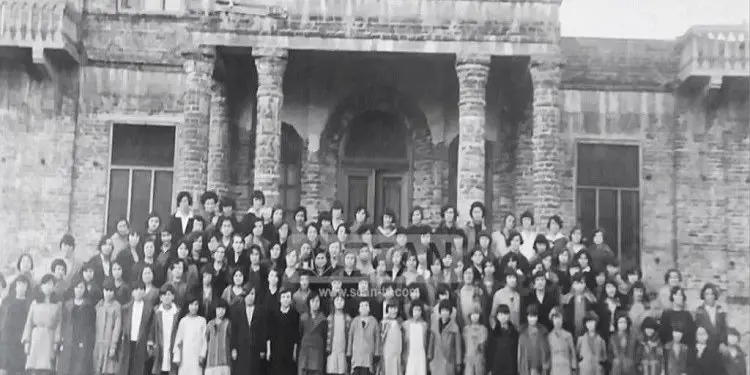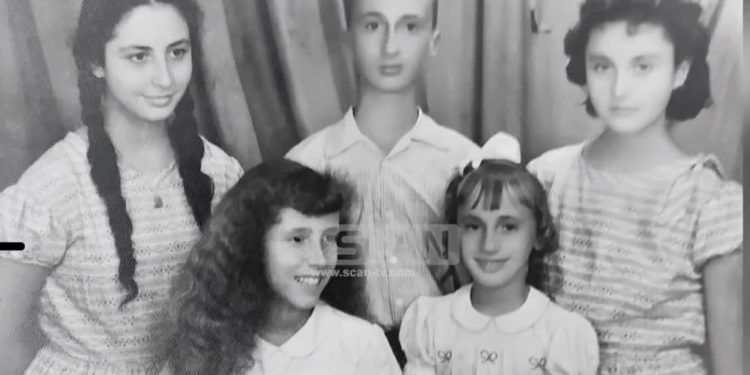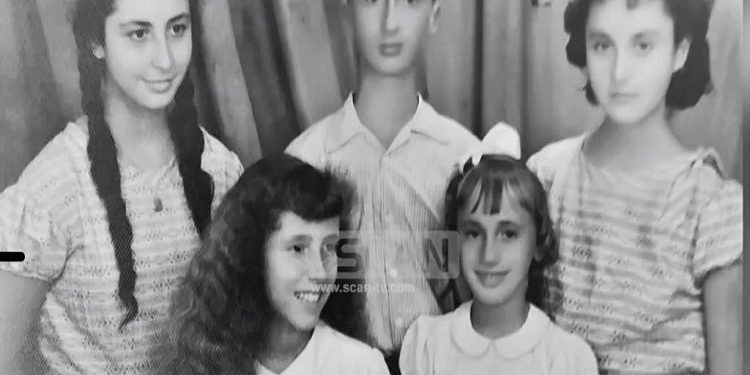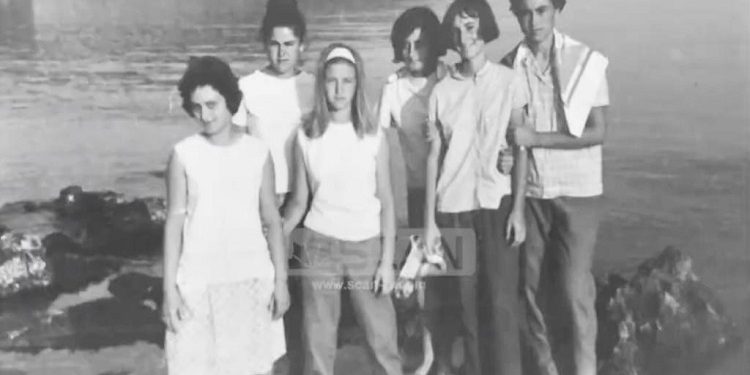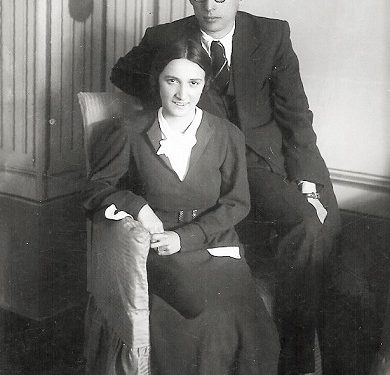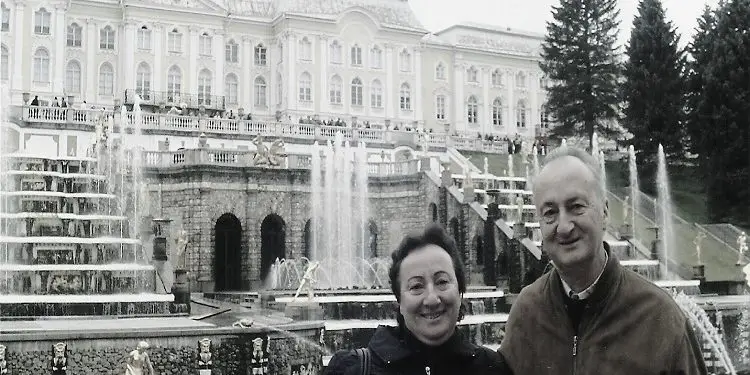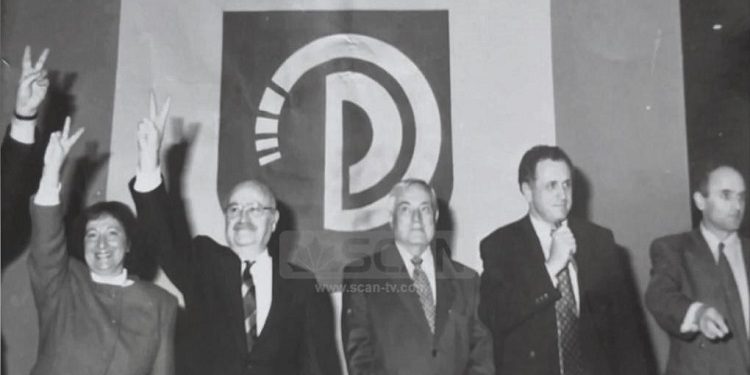By Dashnor Kaloçi
Second part
Memorie.al / Born and raised in a family with intellectual and aristocratic traditions, both from her father’s side (originating from Narta and Vlora), and from her mother (from the city of Durrës), even from four generations of graduated from the most popular universities in Europe, in various branches such as; Law, Economics and Medicine, even the older brother, (one of the icons of Albanian Medicine, for almost half a century), could not “deviate” from the family gene and the path that their forefathers had chosen and traveled, in the current of life. In fact, since she has gone a little further, since in addition to teaching as a lecturer, she has also engaged in active politics, being elected not only as a member of the Albanian Parliament, but also as the vice-president of the Parliament, although for a short time, as long as it lasted that legislature. Taking into account the branch where he graduated and the profession of university lecturer, which he practiced until he retired, and also his brother, who specialized in one of the best university clinics in Paris, at the beginning of the 70s not only has life not “petted” her, but it has also brought her a lot of vicissitudes in her journey and professional career. Due to the class struggle, the Party Committee of Region No. 1 of Tirana, labeled her as: “The daughter of a bourgeois lawyer, who studied in Switzerland before the liberation and she is not worthy to study…” which deprived her of the branch she had chosen to follow. All these already belong to a past time, but due to our continuous requests, Prof. Dr. Margarita Qirko, are “forced” to break the “code of silence” that she has meticulously implemented until today, not remembering those past times, and speaking for the first time, about Memory. al, in an interview, about the history of the family, and hers.
Continues from last issue
Ms. Margarita, after that, did you make an effort as a family and became interested in changing the branch where you would study?
Yes, definitely and immediately we started to be interested. My mother, who had graduated from the American school of Dako, had a classmate, Qibrie Ciun, former vice-minister of Education and Culture, who at that time was the vice-president of the Executive Committee of the district of Tirana, where the rights of the study. Mother wrote her a letter, telling her of my excellent results and through a neighbor of ours who worked on the Executive Committee, delivered the letter to her.
Did you get any response from her?
Yes, definitely, as soon as she saw my mother’s name on the envelope, she immediately took it to our neighbor and then moved my file from Agronomy to Mathematics. But I was not satisfied, because mathematics was not my love. But I had nothing to do, as I remembered what my father had told me about since first grade. So, one day, our family would have such problems.
How did you decide in the family, would you quietly accept the branch they gave you, Mathematics, or did you continue to look for Medicine?
My family advised me that I should go ahead alone, i.e. take the Mathematics branch in complete silence and I should undergo deep study and long hours of the unwanted branch in order to excel in there, just as our ancestors had excelled, i.e. parents and grandparents.
This was my spiritual approval, in front of my family, that I would succeed, performing with great dignity and very good results, this branch “gifted” by the system we lived in. That’s how I started my first year at the Department of Mathematics, at the Faculty of Natural Sciences at the University of Tirana. I got to know the lecturers, who were very prepared and very demanding.
Did you struggle in that branch, as it was not your favorite subject 4?
I had a lot of difficulty in the beginning, but every day, I studied until late at night and I noticed that I was still not completely immersed in mathematics, moving my mind’s eye from time to time to Medicine. The subjects were developed during the semester with colloquia, where the acquisition of knowledge by the students was checked.
The first colloquium came and I was rated quite well. This was the final turn of full confidence in him, for success in this branch, feeling the pleasure of studying mathematics, in acquiring it with ease. Thus, I ended the first year with very good results and I was satisfied with my teachers, for whom I had deep respect and consideration. In the summer, after I finished the first year, I took all the subjects of the second year, where every day I programmed a few hours of study with them, so that it would be easier for me to acquire them, in the following year.
What about the second and third year, continued like the first…?
And so it continued, as I moved forward willingly, and the results were very good. In the third year, one of the most difficult subjects of Mathematics was taught, with the well-known lecturer, Prof. Dr. Petraq Pilika, originally from Korça. Every one of his classes, I followed the entire time with tachycardia, as it was a different lecture from the others. I was amazed by the lectures of this honorable professor and I take the opportunity of this interview to pay him a tribute, so that he may rest in eternal peace.
I remember the honorable professor, Petraq Pilika, with great respect, especially on one of the happiest days in my student life, as it was the maximum evaluation from his side for me, on the day of the exam. So was Prof. Aleko Minga, who will remain for me, until the end of my life, as an icon and model that I wanted to imitate, in my profession in life, as a teacher of Mathematics.
I remember when Prof. started the lecture. Minga, all of us students, were focused on him, as the members and instrumentalists of a symphony orchestra focus on their conductor, as he really created a musicality in the subject of Mathematics and an ease in its acquisition that we did not understand the end of the lesson. Prof. Aleko, was in the hearts of all students, giving them the model and strength to always move forward through honest knowledge. At this moment, the golden words of Viktor Hygoi come to mind: “The future of a country is in the hands of the school teacher”.
How did your studies continue and what were your results at the faculty?
At the beginning of the fourth year, the Faculty of Mathematics formed the special group, with the best students of the three years, who had an average above grade 9. The special group would be created with students who, when they graduate from the university, were foreseen by the state of that time that they would work as lecturers at the University, or scientific workers, at the Center of Computational Mathematics.
How many students were you in that special group?
In the first year, we had a total of 93 students enrolled in that branch, and in the fourth year, in the special group, we were 13 students. After I finished the Faculty with very good results, according to the rules that existed at that time, I had to complete a year of internship in production and then take the state exam to get the diploma.
Where were you assigned to do the internship?
I was assigned to the “Tractor” Plant, where I would work as a Mathematician, in the Technological Bureau of that plant. After I started working there, in the mechanical department, I met two very talented engineers, Vili Kosturi and Gugash Tafa, who at the same time were also good at mathematics. Based on the zeal I had for the work, they proposed to me that we collaborate, to build a nomogram, which would serve the mechanical department. We worked together diligently and at the end of the internship year, I published in the Scientific Bulletin of Natural Sciences the required scientific paper. It was a great spiritual satisfaction, that I had started working on my profession and had results.
How do you remember the state exams when you graduated in Mathematics?
In June 1975, I passed the state exam graded with the highest grade and received my diploma as a Mathematician. Here the school part ended and by this time I was entering the deep and endless ocean of life, where my feet had just touched the cold water of the shore. I was anxiously waiting for the appointment, since a law had been passed to serve 5 years in production.
Where were you appointed?
I was appointed to the high school at night, without separation, from work in the “Tailor and Shoemaker” branches. This appointment was not only well received by my family, but they were very happy as I was close to home. When I showed up at the “Tailor-Shoemaker” secondary school, I was well received and I have the best memories of the team of teachers I worked with and the students as well.
Initially, I was worried about how I would fit in with the students, who came straight from work, tired and of different ages. They continued school, just to add the category at work, which would add a little to their salary. It had been many years since they finished 8th grade and they didn’t remember anything about math.
How did you manage to “implement” in that school?
The first thing I did was seek the help and advice of my father, who, as always, followed my concern and read my thoughts. We went out together for a walk on the big boulevard and he started the conversation about the new job, advising me that my students were not like all ordinary high school students. Those who worked in tailoring were tired women and after working all day, they came to learn mathematics and sleep could overcome them, on the bench where they were sitting.
“Their sufferings – he told me – you will soften them with your kindness, giving them love, so that they will not be afraid of the subject of mathematics, and you will never raise the table, women close to retirement age, but you will perform only written check, in the first banks, to evaluate them with grade. This is how you will act with the students of the Shoe Factory, who will be tougher as students, but acting as with the group of tailors, you will establish an admirable respect in their time as well.” I remember very well that my father ended his advice and suggestions with these words: “There is nothing that cannot be achieved in life, if you say I will do it.”
And did you succeed…?
I say yes, even with great success. I started the lesson, applying the scheme thought above and very quickly, I found myself between their appreciation and love. Their composure and concentration during the explanation was completely on point. The end of the first semester came and I felt satisfied with my achievement with my students. In that school, I worked very diligently and passionately, for five years in a row, and as I said at the beginning, I have the best memories.
And then, where were you appointed?
With the proposal and kindness of Prof. Aleko Mingës, on October 17, 1980, I was appointed assistant in the Department of General Mathematics at the State University of Tirana.
How did your family receive that appointment?
My mother and brother were very happy, but unfortunately my father did not get this joy, as he passed away in 1978. The family encouraged me, telling me that with my hard work, I would become a teacher that I would not I was forgotten by my students. That’s how I started working with students, in almost all branches of Engineering. The groups had many students and the preparation had to be dignified. The students were very inquisitive and the lesson turned into a pleasant debate, where each one, without shyness, gave his idea.
What were your first results as a Mathematics teacher?
At the end of the first semester, in my Mathematics exam, the groups of students did quite well, and the satisfaction, not only faded the accumulated fatigue, but stimulated the strength to work harder, on the way started. In my years of work as a lecturer, I have known excellent, even brilliant students, who increased my love for the profession.
Do you remember any names, who would you single out among your students?
One of them was Nausika Ahmeti, with outstanding intelligence in Mathematics and broad culture, in the field of History and Literature, where the discussion with her, about characters of great authors, was admirable. At the end of the season of Mathematics with Nausicaa, she meets me and says: “Today we are parting professor, forever, but you will always remain inside me, for the support and encouragement you have given me, to move forward alone, thanks to values that I carry!
In order not to forget me and you, I have written a dedication for you. This spiritual gift will always live in your soul and every time you read it, I will be with you in mind and heart.” The dedication is dated May 2, 1986. I missed the feeling with which she had written it, where modesty aside, I learned from her qualities that I had not noticed before about myself. Gratitude in Nausicaa was present in her being and as the theologian and philosopher Adolfo L’Arco said: “Gratitude is the parameter of human greatness”.
How do you continue your work as a lecturer in that Faculty?
I started work on the defense of the dissertation. I had finished my postgraduate exams with very good results. I had to choose the topic of the dissertation, knowing that in Mathematics, it is difficult to choose theoretical topics. I had to find a topic from different areas of life and study scientifically, through the disciplines of mathematics, a special problem of it. Medicine was still my professional love and I chose the topic from this field.
You had the help of your brother. Dr. Spiros?
Undoubtedly, this was the main reason why I chose that topic. During this period, my brother, Spiro, was a cardiologist and echo cardiographer, starting from this, during the entire period of his work, I followed him every day, discussing with him, the cases presented and the results achieved. The topic of the dissertation was: “Some algorithms for the automatic diagnosis of heart diseases”!
It was a tedious topic; did you manage to do it successfully?
The work was very tiring, as it was voluminous and the next day, I had to continue classes regularly at the faculty. At first, I collaborated with my brother to write down all the heart diseases and related diseases along with the corresponding symptoms. Then began the “weighting” of each symptom, for each disease, based on the “Cubic Spline” theory of the Mathematical subject, “Numerical Analysis”.
The work went quite well and we finally formed a questionnaire, which the doctor would carry out, to diagnose the sick. The data of these questionnaires were entered into the computer and by means of the designed program; three diseases appeared on the screen, where the first one was correct. The other two were called differential diagnoses.
Was this only on the theoretical side, or did you also apply it in practice?
We put it into practice, testing this algorithm on 100 patients and the results were accurate. The work of this dissertation was very well received by colleagues and the opinion of Mathematicians. It was July 1987, when I defended my dissertation at the Scientific Council of the Faculty of Natural Sciences, and the room was filled with fellow mathematicians. Also that day some doctors had come there, for the topic related to cardiology. I will never forget the sincere words, with a lot of kindness and giving courage of Prof. Pertaq Pilikes, who said publicly: “I am happy that my student has reached this far”!
Defending the dissertation successfully, was it a joy for you?
Without a doubt, I say that it was one of the most beautiful days of my life, as I fulfilled my quality duty in my profession and fulfilled the legacy of my father and my family, to be a lady forever, with honest work. After the defense of the dissertation, which I took at the appointed time, within seven years of coming to the University, I was appointed a lecturer of mathematics subjects at the University.
This period of time, when you were appointed as a lecturer at the University of Tirana, belongs to the end of the 80s, when the economic and social situation in Albania was extremely difficult, due to the great poverty that came from almost 40 years of isolation of the country, etc. How did you personally experience that time, but also in your family?
As you also said, the economic situation in 1988 was difficult, food stamps and endless queues prevailed. The conditions of the students in the dormitories were miserable and a certain silent discontent had begun. In 1989, movements started against the communist system in the countries of Eastern Europe. This movement had a great echo in our country, when on July 2, 1990, the event of the embassies took place, where a large part of the youth and the population entered there and fled abroad for a better life.
Since the first days of the Student Movement in December ’90, I joined my students, as I had a great “hunger” for freedom. During my life, until 1990, it seemed to me that I had not lived, but simply, vegetated. The arrival of democracy in its beginnings was the most beautiful period of my life, because for me the thought did not come from the brain, but from the drunkenness of the soul. I was running to catch him, believing him to the last cell of my soul, along with many other good, honest and trustworthy people.
In active politics, when did you get involved?
I have been engaged in active politics since September 1991, when I was elected a member of the National Council of the Democratic Party. There were many debates in the National Council and we all discussed with passion, but I remember that the most beautiful and golden day for the people and for all of us was March 22, 1992, when the Democratic Party won and rallies were held throughout Albania. Especially in Shkodër and Tirana, which crowned the profound victory of the DP, which brought it to power?
Joy was present throughout Albania, people seemed reborn. I also remember the first Pluralist Parliament, in the years 1992-1996, where its president was Mr. Pjetër Arbnori, a persecuted politician, who had served a full 28 years in prison. The group of deputies of the Democratic Party was well prepared in the analysis of the painful facts that happened in the communist period.
The debates were tough with the opposing side, where most of them were communists or with similar mindsets, but the Speaker of the Parliament, Mr. Arbnor was a learned man, clever, and with the elegance of his intelligence and his experience of courage in prison, often avoided their shouts, which always provoked noise, as the only means of not hearing their inhuman deeds in years. But of course, mistakes were made in those years, even serious ones. Memorie.al
The next issue follows




